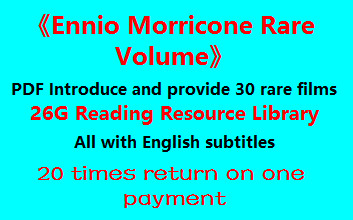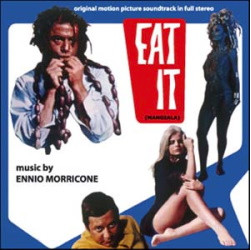MANGIALA [EAT IT] (1968)
Mangiala, or Eat It, is an Italian comedy film directed by Francesco Casaretti, starring Frank Wolff, Paolo Villaggio, and Giampiero Albertini. It’s one of the most obscure and little known films in Morricone’s history; one of the few pieces of information I could find about the film describes it as ‘a grotesque satire on advertising in a consumer society, wherein whoever eats too much tinned wheat turns into a cow’. I’m not sure whether that makes me want to see it more or see it less but it’s certainly unique.
Morricone’s score is equally quirky, jumping around from style to style and incorporating everything from classical motifs and pretty romantic themes, to musical nursery rhymes, vibrant bossa nova rhythms, disturbing moments of abstract experimentalism, and more, all of which are intended to – as the CD liner notes state – ‘embrace all the psychological and environmental nuances of alienation and paradox that mark the plot of the film.’
The main theme, “Eat It,” jumps around from style to style, beginning with an oddly calming and pleasant piece for orchestra and chimes, but which then quickly becomes a poppy and pretty arrangement for a guitar-harpsichord-percussion combo, and a keyboard which seem to be playing the melody from Frere Jacques. Much of the rest of the score is based on variations on these core ideas, with added jazz textures and tropical grooves that are great to listen to, but seem to be completely at odds with the film itself.
I especially like the way the quirky harpsichords and keyboards are underpinned by lush strings in “Notti di Pace,” the dream-like textures of “Amami,” the strident tango rhythms of “Ballami,” the hypnotic tribal beats and fuzzy electric guitars in “Africami,” the honkytonk piano jazz in “Pianofortecciami,” and the wonderful combination of contemporary church music stylings and prog rock in “Falsa Sacrilita,” especially when the unmistakable choir I Cantori Moderni di Alessandro Alessandroni comes in at the end.
Eat It is an odd score, to be sure, and when you first listen to it you’re never sure exactly where Morricone is going or what he’s doing from one cue to the next. However, the fact that it contains so many of Morricone’s great 1960s stylistics and little idiosyncratic hallmarks means that fans of his will love it, especially the ones who are more attuned to his experimentations with psychedelia and Euro-pop. The version of the score reviewed here is the one released as a standalone album by Digitmovies in 2010, and contains 45 minutes of music. Shorter releases are also available in 2-for-1 releases; usually on the CAM label paired with the score for the 1975 score Macchie Solari.
Track Listing: 1. Eat It (Tema) (2:58), 2. Prima Variazione: Mangiami (2:00), 3. Notte di Pace (II Variazione) (2:26), 4. Terza Variazione Amami (1:48), 5. Quarta Variazione: Ballami (1:39), 6. Quinta Variazione: Africami (2:01), 7. Sesta Variazione: Pianofortecciami (1:10), 8. Settima Variazione: Temimi (3:34), 9. Settima Variazione: Temimi (2a Versione) (1:12), 10. Ottava Variazione: Pizzicami (1:45), 11. Eat It (1:57), 12. Falsa Sacralità (6:57), 13. Eat It (Ripresa 2) (1:42), 14. Notte Di Pace (1:46), 15. Prima Variazione: Mangiami (Ripresa 2) (2:58), 16. Settima Variazione: Temimi (3a Versione) (1:04), 17. Prima Variazione: Mangiami (Ripresa 3) (1:40), 18. Sesta Variazione: Pianofortecciami (Ripresa 2) (1:50), 19. Eat It (Ripresa 3) (1:29), 20. Eat It (Versione Singolo) (3:47). Digitmovies CDDM-172, 45 minutes 43 seconds.












